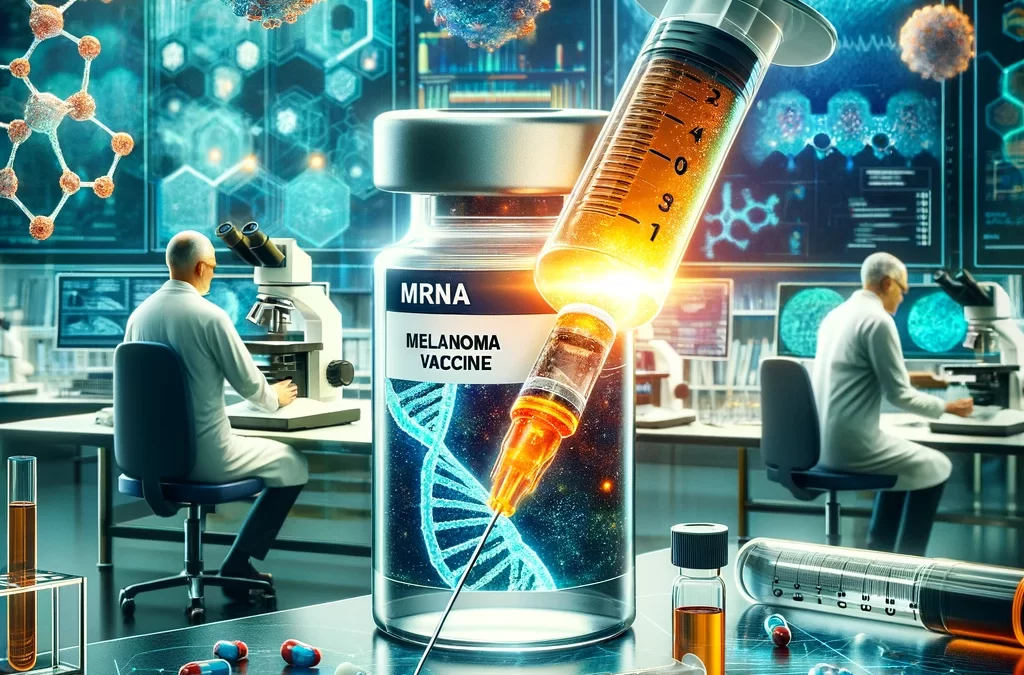The world became familiar with Messenger RNA (mRNA) vaccines during the COVID-19 pandemic, as this was the technology used to develop COVID vaccines so quickly. However, this vaccine technology was originally designed to be used against cancer. A recent study evaluated a personalized mRNA vaccine for melanoma, and researchers found that these shots could potentially prevent the disease from recurring. The vaccine will undergo further testing in another study later this year.
Methodology of the Clinical Trial
The researchers first recruited 157 melanoma patients who had their tumors surgically removed and who were at a high risk of cancer recurrence. The immunotherapy medication Keytruda was administered to 50 of these patients. The remaining 107 were treated with both Keytruda and a personalized vaccine. The results were analyzed to determine the potential efficacy associated with use of the vaccine.
Results Presented at American Association for Cancer Research Meeting
This study evaluated a personalized vaccine built with mRNA technology. The vaccine used mutations to target specific mutations unique to each patient’s cancer while avoiding affecting healthy cells. The trial participants were all given doses of the immunotherapy drug Keytruda (pembrolizumab), which is the standard of care for high-risk melanoma patients. In addition to receiving Keytruda, two-thirds of the participants were also given the mRNA vaccine.
The results of this phase 2 clinical trial were presented at the annual meeting of the American Association for Cancer Research on Sunday, April 16, 2023. According to the researchers, the results show that patients who received the mRNA vaccine were 44 percent more likely to survive and avoid new tumors after two years compared to those who only received Keytruda.
What Are Personalized Cancer Vaccines?
While most vaccines that we know are used to prevent contagious illnesses, cancer vaccines are typically used to treat existing cancers. A cancer vaccine attempts to trigger the immune system into attacking cancerous cells in the body. There are various types of cancer treatment vaccines. Some are comprised of cancer cells, others are made of parts of cells, and others are made of pure antigens (specific proteins on cancer cells).
Each incidence of cancer is unique, with its own specific genetic mutations. A personalized cancer vaccine is tailor-made to effectively account for these unique alterations, rather than prescribing the same “one-size-fits-all” treatment regimen for every patient.
A New Approach to Cancer Vaccines
According to study co-author Dr. Ryan Sullivan, the recent phase 2 clinical trial provided researchers with the first significant data that suggests personalized vaccines should be further explored. Rather than using a vaccine to prevent or shrink tumors, these new mRNA vaccines are intended to reduce the odds of high-risk melanoma recurring. Recurrence is the focus, and these vaccines are not designed to prevent melanoma from occurring in the first place.
To create the vaccine, scientists surgically remove tumors or conduct separate biopsies. Samples of blood and tissue are then sent for genetic sequencing. Researchers look for proteins that are unique to the individual’s cancer and not found in any of their body’s healthy tissue. The vaccine is designed to target up to 34 of these proteins, teaching the immune system to recognize them and ultimately kill the cells that create them without harming healthy tissue.
Since there are so many possible neoantigens based on the patient’s unique genetics and the evolution of their tumor cells, the vaccines must be designed specifically for each patient. Researchers do not currently know how many neoantigens to target or which targets are most likely to yield major benefits, so they include as many as possible. It takes about eight weeks to manufacture each vaccine.
Combination Treatment with Keytruda
While the patients in this trial awaited this vaccine, they were given Keytruda, which helps the immune system attack cancer. This drug was administered in 30-minute infusions every three weeks for a full year. The patients received two to three doses of Keytruda while waiting for their vaccines to be prepared, they were given nine vaccine doses alongside another nine infusions of Keytruda. Then they received Keytruda only until the year was up.
According to the results of the study, melanoma recurred within two years in 22 percent of participants who received both Keytruda and a personalized cancer vaccine. Conversely, 40 percent of those who only received Keytruda had their melanoma return. This is close to a 50 percent reduction in cancer relapse among the study population receiving individualized vaccines.
Next Steps
Based on the encouraging results of this small phase 2 clinical trial, Merck is planning to start a larger phase 3 trial later this year. This trial will be open to people with Stage 2 or Stage 3 melanoma. If these results are replicated, it could signal a major step forward for cancer vaccines. With the trial, follow-up, and monitoring, the researchers say that it could take at least two years before data is sent to the Food and Drug Administration. This means it could be up to three years before the vaccine-Keytruda combination treatment could be approved for use in patients.
The researchers believe that these vaccines could be used to treat other cancers that are controlled by the immune system. They plan to test non-small-cell lung cancer next, which accounts for about 100,000 deaths in the United States each year.

